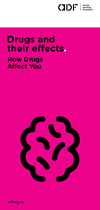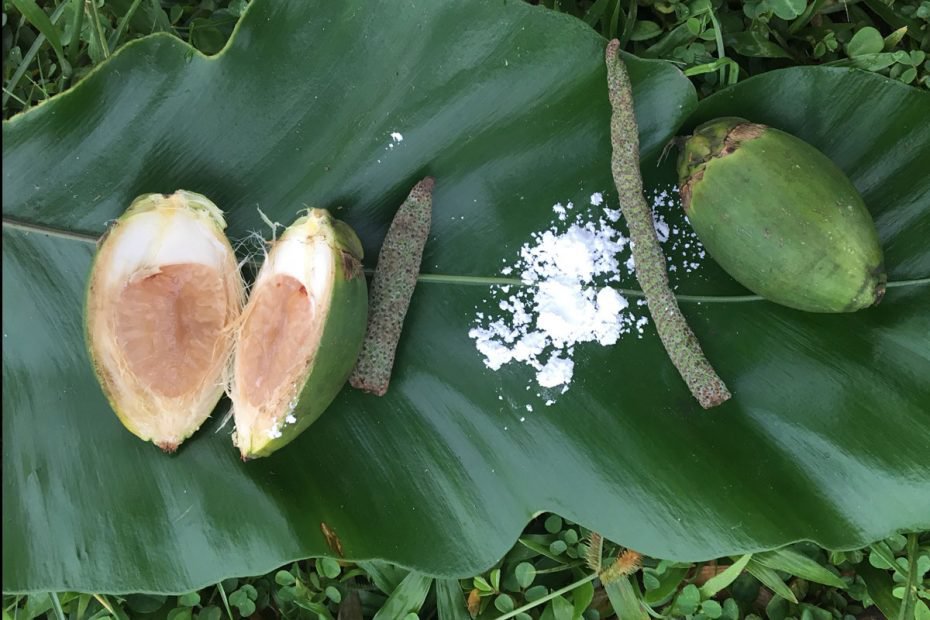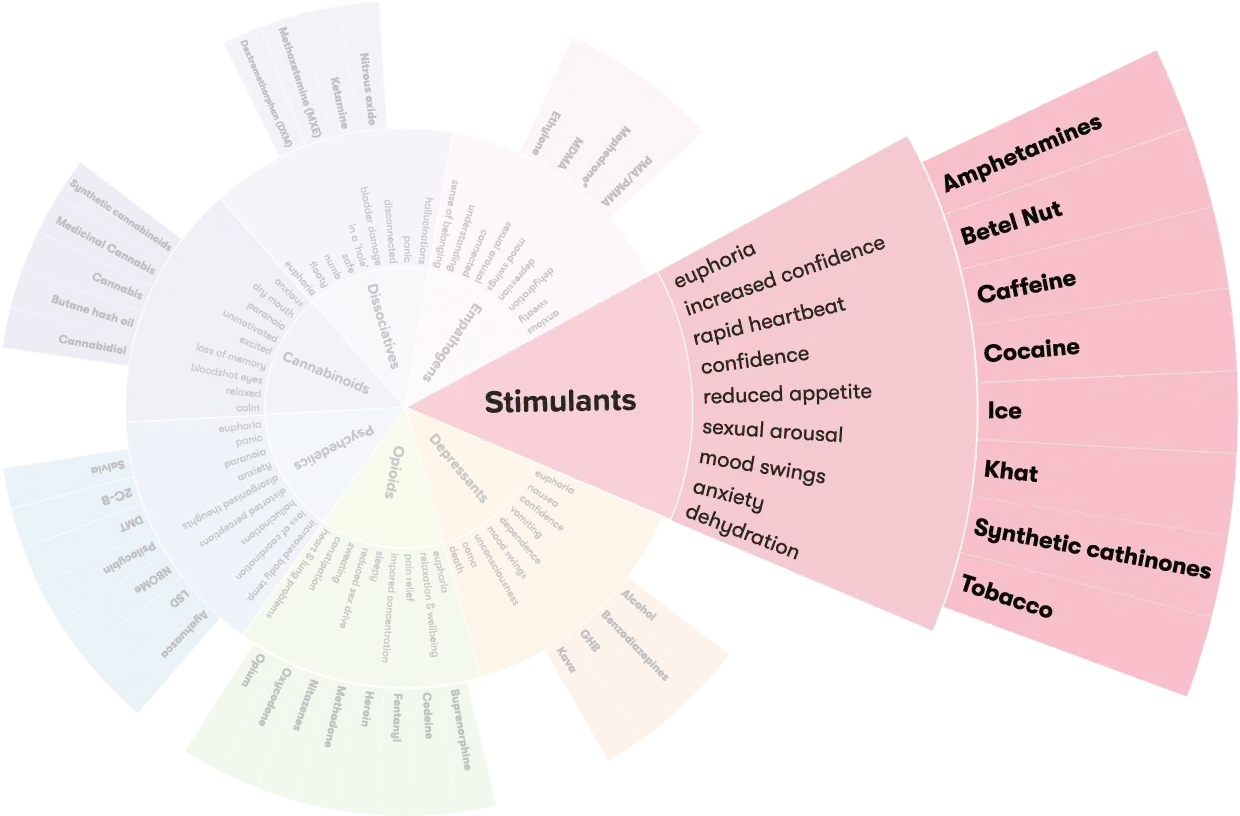
Drugs & their effects: How drugs affect you (bundle of 50)
Pamphlets
$36.32 (inc. GST)
View in ADF Shop
How is betel nut used?
The seed is separated from the outer layer of the fruit and may be used fresh, dried, boiled, baked, roasted or cured.2
The most common method of using betel nut is to slice it into thin strips and roll it in a betel leaf with slaked lime (powder) or crushed seashells. This leaf package is known as a betel quid, betel nut chew, betel chew, betel pan or betel paan (India).2,3
Betel quids may also contain tobacco and other additives such as cloves, cardamom, nutmeg, aniseed, coconut, sugar, syrups and fruit extracts, to enhance the flavour.3
Cultural practice
Betel nut chewing is an important cultural practice in some regions in south and south-east Asia and the Asia Pacific. It has traditionally played an important role in social customs, religious practices and cultural rituals.3
Some people from these regions who have settled in other countries have continued their cultural practice of chewing betel nut.3
Effects of betel nut
Use of any drug can have risks. It’s important to be careful when taking any type of drug.
Betel nut affects everyone differently, based on:
- Size, weight and health
- Whether the person is used to taking it
- Whether other drugs are taken around the same time
- The amount taken
- The strength of the drug (varies from batch to batch)
The effects of betel nut are not fully understood and further research is needed. However, people who have used the drug have reported the following effects:
- Relaxed, feeling happy
- Feeling alert
- Fast heart rate and palpitations
- High blood pressure
- Red face and feeling warm
- Sweating3
People who use betel nut for the first time, and people who have used it before who take a large amount or a strong batch, may experience the following:
- Tremors
- Dizziness
- Upset stomach, diarrhoea, vomiting
- Psychosis4,5
Long-term effects
Regular, heavy use of betel nut may eventually cause:
- Discolouration of teeth and gums, sometimes turning them reddish-brown
- Mouth ulcers and gum disease
- Oral cancers or sub mucous fibrosis (a pre-cancer condition)
- Stomach ulcer
- Heart disease7
- Needing to use more to get the same effect
- Dependence on betel nut
- Financial, work and social problems
Tolerance and dependence
People who regularly use betel nut can become dependent on the drug. They may feel they need betel nut to go about their normal activities like working, studying and socialising, or just to get through the day. They may also develop a tolerance to it, which means they need to take larger amounts of betel nut to get the same effect.7
Mixing betel nut with other drugs
Mixing betel nut with other drugs can be have unpredictable effects and increase the risk of harm.
- Betel nut and tobacco: greatly increases the risk of developing oral cancers.3
- Betel nut and antidepressants/antihistamines/scopolamine: Betel nut may decrease the effects of these types of medications.8
Reducing harm
There are ways you can reduce the risk of harm when using betel nut:
- avoid mixing betel nut with tobacco
- avoid use if you have an existing heart problem
- practice good dental health and brush regularly
- people with an existing mental health concern - should avoid use
- avoid using betel nut late at night
- avoid useing during pregnancy
- have regular dental health checks
- maintain good nutrition and drink water and healthy foods
- avoid regular long term use.1, 8-10
Withdrawal
Giving up betel nut after using it for a long time is challenging because the body has to get used to functioning without it.
Betel quid users have reported experiencing withdrawal symptoms that are similar to nicotine withdrawal,11 including:
- cravings
- feelings of distress/discomfort
- dry mouth
- irritability
- anxiety
- fatigue
- inability to concentrate
- altered taste.7
Getting help
If your use of betel nut is affecting your health, family, relationships, work, school, financial or other life situations, or you’re concerned about someone else, you can find help and support.
Call the National Alcohol and Other Drug Hotline on 1800 250 015 for free and confidential advice, information and counselling about alcohol and other drugs
Help and Support Services search
Find a service in your local area from our list. Simply add your location or postcode and filter by service type to quickly discover help near you.
If you're looking for other information or support options, send us an email at druginfo@adf.org.au
Path2Help
Not sure what you are looking for?
Try our intuitive Path2Help tool and be matched with support information and services tailored to you.

The active ingredient in betel nut is arecoline, which is a Schedule 4 poison (prescription only medicine) and therefore is illegal to possess or sell without proper authority. Importation of Betel Nut into Australia is also prohibited.12
See also, drugs and the law.
Around 10–20% of the world’s population chews betel nut in some form. This makes it the 4th most widely-used psychoactive substance, after nicotine, alcohol and caffeine.1,13
- International Agency for Research on Cancer. Betel-quid and Areca-nut Chewing and Some Areca-nut-derived Nitrosamines: World Health Organization; 2004 [30.10.2023].
- Gupta P & Ray C. Epidemiology of betel quid usage. Annals of the Academy of Medicine Singapore [Internet]. 2004 [08.11.2023]; 33:[31-6 pp.].
- World Health Organization. Review of areca (betel) nut and tobacco use in the Pacific: a technical report. 2012 [08.11.2023].
- Huang Z Xioa B Wan X Li Y & Deng H. Betel nut indulgence as a cause of epilepsy. Seizure [Internet]. 2003 08.11.2023]; 12:[406-8 pp.].
- Hafeman D Hibibul A Islam T & Louis E. Betel quid: Its tremor‐producing effects in residents of Araihazar, Bangladesh. Journal of the International Parkinson and Movement Disorder Society [Internet]. 2005 [08.11.2023]; 21(4).
- Bhat S Blank M Balster R Nichter M & Nichter M. Areca Nut Dependence Among Chewers in a South Indian Community Who Do Not Also Use Tobacco. Addiction [Internet]. 2010 [08.11.2023]; 105(7):[1303–10 pp.].
- Benegal V, Rajkumar RP, Muralidharan K. Does areca nut use lead to dependence? Drug and Alcohol Dependence [Internet]. 2008 [03.11.2023]; 97(1):[114-21 pp.].
- RxList. Betel Nut: WebMD; [03.11.2023]. Available from:
- NSW Health. Betel nut products and preparations 2021 [03.11.2023].
- Dhingra K, Jhanjee S. A Review of Intervention Strategies for Areca Nut Use Cessation. Indian Journal of Psychological Medicine [Internet]. 2023 [03.11.2023]; 45(2):[117-23 pp.].
- Little MA, Pokhrel P, Murphy KL, Kawamoto CT, Suguitan GS, Herzog TA. Intention to quit betel quid: a comparison of betel quid chewers and cigarette smokers. Oral Health Dent Manag [Internet]. 2014 03.11.2023]; 13(2):[512-8 pp.].
- Australian Government. Federal Registar of Legislation, Schedule 23 Prohibited plants and fungi. Canberra [17.11.2023].
- Zdrojewicz Z Kosowski W Królikowska N Stebnicki M & Stebnicki M. Betel - the fourth most popular substance in the world. Polish Medical Journal [Internet]. 2015 [08.11.2023]; 231:[181–5 pp.].

